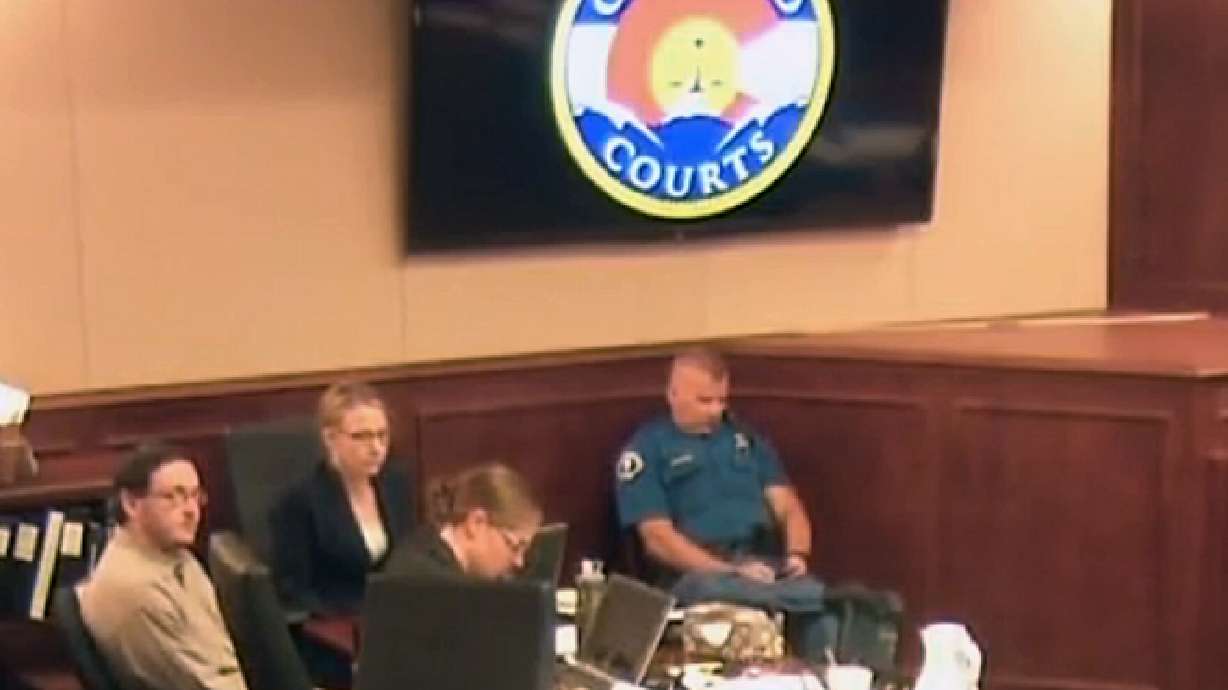Estimated read time: 4-5 minutes
This archived news story is available only for your personal, non-commercial use. Information in the story may be outdated or superseded by additional information. Reading or replaying the story in its archived form does not constitute a republication of the story.
CENTENNIAL, Colo. (AP) — The defense in the Colorado theater shooting trial rested its case Friday after trying to show James Holmes was legally insane when he opened fire at a midnight movie and was suffering from delusions that each person he killed would increase his self-worth.
Holmes' public defenders ended their case after playing two silent surveillance videos of Holmes taken in the months following the attack. One showed him in his jail cell, running and slamming his head against the wall, then falling backward and sitting down.
The other, taken at a hospital, showed Holmes naked and tethered to a bed, repeatedly trying to cover his head with a blanket and then a sheet. Uniformed officers and hospital workers pull them off and try to cover the lower half of Holmes' body with them.
Jurors also read a sheaf of papers that included writing by Holmes titled "Galactic Colonization," but the contents were not discussed in court.
The decision to rest the case ended 10 weeks of often-gruesome testimony, with witnesses describing the bloody shooting scene and their own crippling wounds and attorneys probing psychiatrists about Holmes' mental condition.
Judge Carlos A. Samour, who on Friday denied a defense motion to acquit, dismissed the jury until Tuesday, when closing arguments and a formal reading of jury instructions will be made. That's also when the judge will reveal the 12 jurors who will deliberate the case and seven alternates who will report to the courthouse but have no contact with the others.
Formal deliberations are expected to begin Wednesday morning.
Scott Robinson, a trial lawyer and legal analyst, said prosecutors had the upper hand from the beginning because of the evidence of Holmes' extensive planning for the attack, down to calculating how fast authorities were likely to respond to the theater. He says it's unlikely the jury will find Holmes not guilty by reason of insanity but that the evidence of mental illness might persuade jurors to spare his life.
"The preparations he engaged in, both for the assault on the theater and to booby-trap his apartment, at least on the surface, were so elaborate and extensive that the average Joe or Jill on the street will have a hard time seeing that as the work of a deranged individual," he said.
Public defenders presented two weeks of testimony that featured a pair of psychiatrists who found that Holmes met the legal standard for insanity. Defense attorneys also highlighted his sometimes-bizarre behavior after the shooting, which included playing with paper bags that were placed over his hands to preserve gunshot residue.
Earlier in the trial, two court-appointed doctors testified for the prosecution that Holmes knew the difference between right and wrong at the time of the killings and therefore was sane under Colorado law.
From the start, Holmes' lawyers contended that he was in the grips of a psychotic episode when he killed 12 and wounded 70 at the Denver-area theater.
Their task was to raise reasonable doubt about whether Holmes was sane and show he should not be held accountable for his actions because of his depleted mental state.
In Colorado, prosecutors have the burden of proof in insanity cases. Most states and the federal system place that burden on defendants.
The defense made its largely clinical case in about a quarter of the time that prosecutors took.
Its star witness, schizophrenia expert Dr. Raquel Gur, said Holmes showed signs of schizophrenia even before he began post-graduate neuroscience studies in Colorado in 2011 and that he was emotionless in 28 hours of interviews over two years.
Holmes' psychosis rendered him incapable of knowing right from wrong at the time of the shooting, she declared flatly.
Gur, head of neuropsychiatry at the University of Pennsylvania medical school, said Holmes still suffers from the bizarre delusions that preoccupied him before the shooting, including his belief that killing others would increase his own self-worth.
Holmes' attorneys also referenced a family history of disorders, including an aunt of Holmes' who had schizophrenia and a grandfather who was institutionalized.
Holmes did not take the stand. When asked about his decision Thursday by the judge, Holmes replied "I choose not to testify" in a clear, firm voice.
Prosecutors had been widely expected to call rebuttal witnesses, but they did not.
During a break after the defense rested, Holmes' parents, Robert and Arlene Holmes, stood up from their seats in the second row of the gallery, his left arm around her shoulder and their heads lowered toward one another for a brief moment. They have been at the trial every day, but their son has rarely turned around to acknowledge them.
___
Associated Press Writer Ivan Moreno in Denver contributed to this report.
Copyright © The Associated Press. All rights reserved. This material may not be published, broadcast, rewritten or redistributed.








